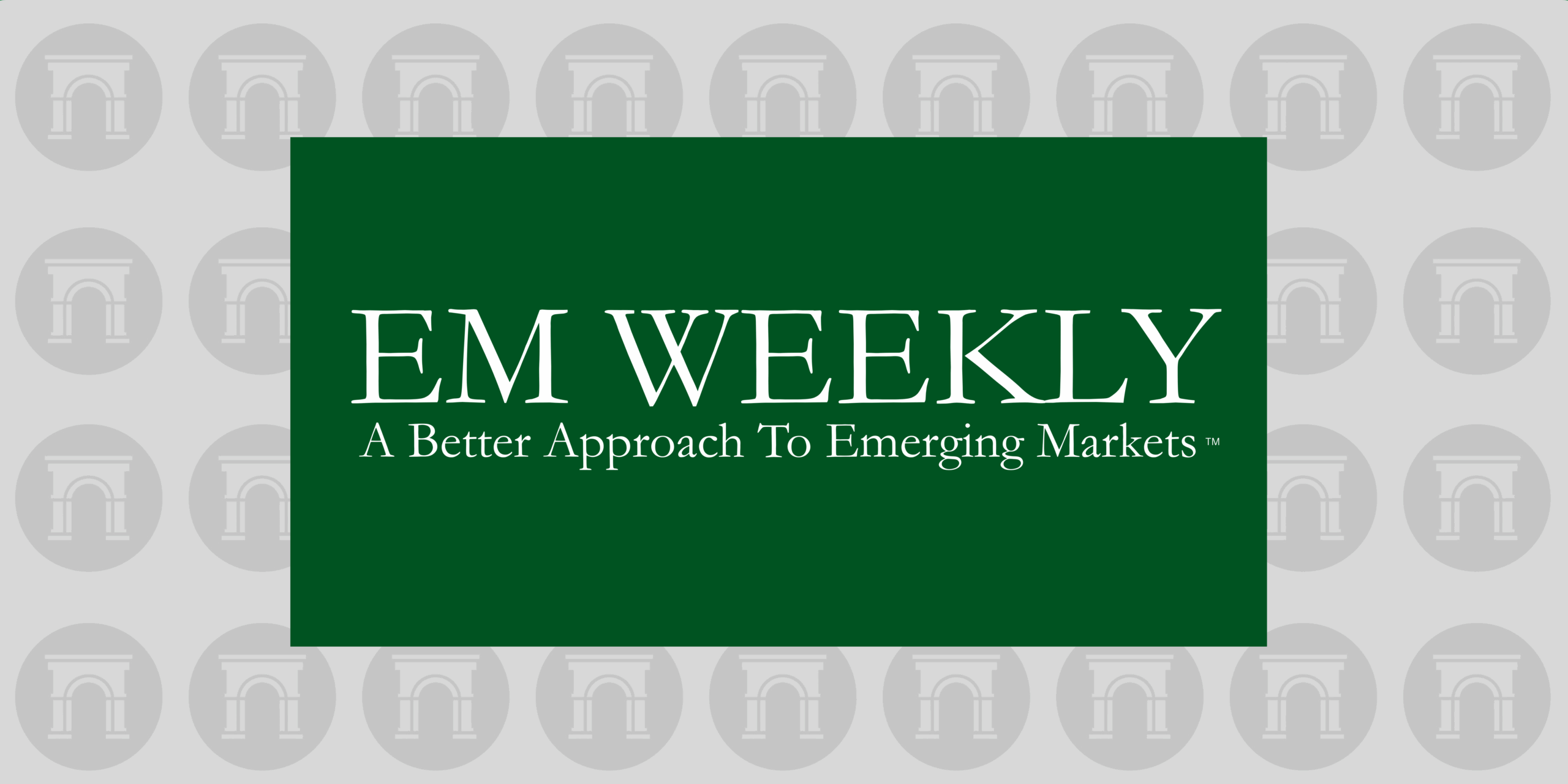Contents
Market Overview
Macro Update
Geopolitics and global governance were in focus this week as world leaders gathered in New York for the 80th UN General Assembly. Discussions covered a wide range of issues, including military conflicts, trade reform, AI, and climate change, with several notable developments.
U.S. President Donald Trump, following a meeting with Ukrainian President Volodymyr Zelenskiy, appeared to shift his position on the war, stating that Ukraine, with European support, could “win back” all its territory. He also suggested that NATO countries should respond more assertively to Russian aircraft entering allied airspace – language that was pointed and seemed to encourage Europe to take greater responsibility in the conflict. Meanwhile, German Chancellor Friedrich Merz threw his backing behind an EU plan to leverage frozen Russian assets to provide Ukraine with a €140 billion interest-free loan.
France, the UK, Canada, Australia, Portugal, and Belgium formally recognized a Palestinian state, adding momentum to recent diplomatic initiatives. However, the United States and Germany declined to attend a summit on the two-state solution co-hosted by France and Saudi Arabia, reflecting continued divergence among Western allies on the path forward in the Middle East.
In addition, the U.S. pledged support for Argentina as the country grappled with renewed currency pressures. Talks are ongoing around a potential $20 billion swap line with the central bank, alongside possible bond purchases. In response, Argentina temporarily suspended export taxes, triggering $7 billion in grain sales. The peso strengthened, and sovereign bonds rebounded from recent lows.
The policy backdrop also remained a key focus for markets. Fed-speak this week highlighted growing divisions within the FOMC, particularly between Chair Jerome Powell and newly appointed Governor Stephen Miran. The two differ notably on the estimated neutral rate – by as much as 100bps – and on how quickly policy should converge toward it. These differences reflect contrasting views on the persistence of inflation, including the potential price effects of tariffs. Still, all Fed officials continue to emphasize labor market conditions as a key policy guide.
On the data front, U.S. GDP for Q2 was revised up to 3.8% annualized (from 3.3%), driven by stronger personal consumption, which rose 2.5% vs. a 1.7% consensus. U.S. personal spending was also robust in August (0.6% month-on-month vs 0.5% expected), suggesting consumers continue to power the economy despite elevated inflation. The Core Personal Consumption Expenditures index, considered the Fed’s preferred inflation measure, rose 0.2% month-over-month in August and 2.9% year-over-year, remaining stable.
The final University of Michigan Consumer Sentiment Index for September declined to 55.1, from a preliminary reading of 55.4 and 58.2 in August, marking a third consecutive monthly drop in the index. Initial jobless claims came in lower than expected at 218,000. Preliminary September PMIs modestly missed expectations but remained in expansion territory. In the eurozone, manufacturing activity remained weak, while services showed some resilience in Germany and at the bloc level. UK data disappointed across the board, reinforcing the case for further monetary easing.
Central banks in Switzerland, Hungary, and the Czech Republic held rates steady, while Mexico delivered a 25bps cut, in line with expectations. Meanwhile, China left its benchmark lending rates unchanged for a fourth straight month, at 3.0% and 3.5% for the one-year and five-year rate, respectively. The People’s Bank of China (PBoC) faces a mixed picture: While overall economic activity remains weak, trade tensions with the U.S. appear to have subsided, and the mixed macro environment continues to underpin the authorities’ cautious approach as they continue to refrain from major stimulus measures.
Markets traded with a modest risk-off tone this week. U.S. Treasury yields were stable, with the 10-year finishing the week around 4.15% and the 30-year at around 4.75%. The dollar strengthened to its highest level month-to-date on the DXY (above 98) but remains subdued. Brent and WTI climbed roughly $3 per barrel, their largest weekly gain since July, amid mounting risks on Russian supply. Gold edged higher to just under $3,800 per ounce, supported by ongoing demand for inflation protection and portfolio hedging.
EM Credit Update
Emerging Markets (EM) fixed income posted mixed results again this week, reflecting divergence across sub-asset classes and credit quality segments. EM hard-currency sovereign debt gained 0.39%. The high-yield segment led gains with a return of 0.83% while investment gain retreated slightly at -0.05%. At the index level, spreads tightened by 10bps, driven by a -19bps move in high yield, while investment-grade spreads were only tighter by 2bps.
Latin America was the only region to post positive results this week, supported by a strong rally in Argentina as the U.S. announced financial support for the country. For example, the Argentina 2030 bonds rallied 14 points on the back of the announcement. Ecuador and Venezuela also performed well this week. The former benefited tangentially from a strong relationship with the U.S. administration, and the latter continues to benefit from investor hopes that U.S. action will lead to regime change. Elsewhere, markets were broadly weaker as investor sentiment paused following recent gains.
EM corporate performance was marginally negative this week, returning -0.03%, with high yield up and investment grade down (+0.07% vs. -0.10%). Spreads tightened by 4bps, with similar moves across credit buckets. Regionally, Latin America and Eastern Europe were the two regions with positive returns, supported by better risk sentiment in Argentina and Ukraine-related sovereign developments. Credits in the ‘B’ – rated category outperformed this week. Brazil underperformed this week, impacted by the announcement by Braskem SA, Brazil’s leading chemical company, that it had hired financial and legal advisors to optimize its capital structure.
Local-currency debt was the weakest EM sub-asset class this week, returning -0.66% as the dollar strengthened a bit on the back of stronger U.S. economic data. Türkiye, Uruguay and South Africa were the only countries with positive local currency returns. On the other hand, Indonesia and the Philippines underperformed amid mixed regional economic data.
In the primary market, activity picked up again with a total of 35 hard-currency deals priced across sovereign and corporate issuers in all EM regions. Corporates dominated, while sovereign supply was limited to two issuers: Latvia (in EUR) and Abu Dhabi (in USD).
The Week Ahead
Next week, central bankers will be out in force across the globe, with investors parsing through their speeches for clues on the direction of monetary policy in developed and emerging economies. The U.S. federal government is set to run out of funding at 11:59 p.m. on September 30th unless lawmakers can agree on a new budget or a stopgap funding bill. In China, the Golden Week holiday starts, and all eyes will be on consumption. EU heads of state will hold an informal meeting in Copenhagen focused on Ukraine and bolstering defense readiness, while Russia’s Valdai Discussion Club think-tank holds its annual meeting in Sochi, with top officials likely to speak. Moldova and the Czech Republic will hold Parliamentary elections.
On the data front, markets will be eagerly awaiting the September U.S. nonfarm payrolls report, which will be the first since the Fed began easing monetary policy; weak data could reinforce expectations for further rate cuts and vice versa. Other notable data releases in U.S. include unemployment, ISM services, Conference Board Consumer confidence, ISM manufacturing, manufacturing PMI, and initial jobless claims. Globally, preliminary September CPI will be reported in the eurozone, Spain, France, Germany, Italy, Kenya, Poland, Sri Lanka, Austria, South Korea, Switzerland, Türkiye, Indonesia, and Pakistan. Final 2Q GDP numbers will be released by Pakistan, the Czech Republic, Denmark, and the UK. Central bank rate decisions are due in Israel, Australia, Colombia, and India.
Fixed Income
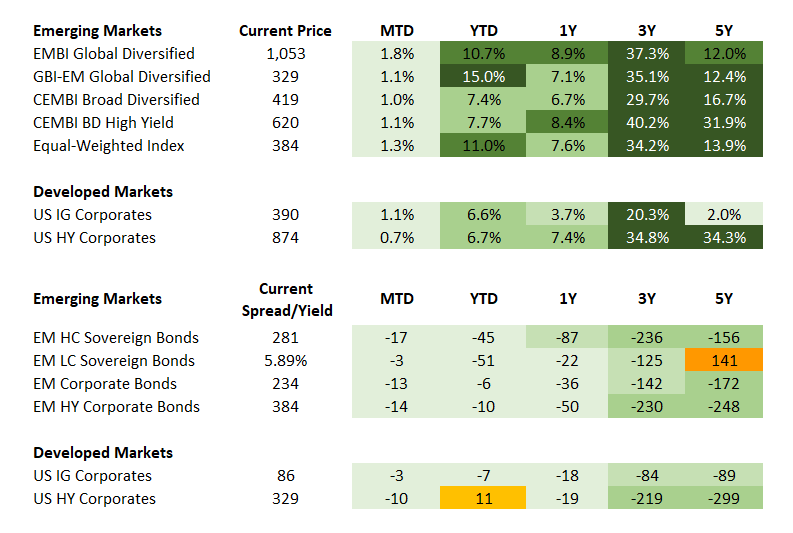
Equities
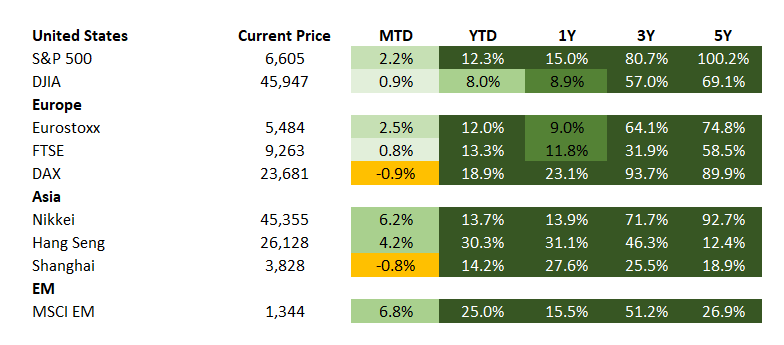
Commodities

Source for data tables: Bloomberg, JPMorgan, Gramercy. EM Fixed Income is represented by the following JPMorgan Indicies: EMBI Global, GBI-EM Global Diversified, CEMBI Broad Diversified and CEMBI Broad High Yield. DM Fixed Income is represented by the JPMorgan JULI Total Return Index and Domestic High Yield Index. Fixed Income, Equity and Commodity data is as of Sept. 26, 2025 (mid-day).
Highlights
Argentina Sees Currency Relief Amid U.S. Pledge and Export Tax Holiday
Event: In response to last week’s unsustainable foreign exchange pressure, Argentina temporarily scrapped export taxes, catalyzing $7 billion in grain sales. The U.S. pledged support to Argentina that includes an ongoing negotiation of a $20 billion swap line with Argentina’s central bank and the potential purchase of secondary or primary government debt. President Trump called Argentine President Javier Milei “a very good friend, fighter, and WINNER” and gave him his “Complete and Total Endorsement for Re-Election as President.” The peso appreciated, and eurobonds retraced last week’s losses.
Gramercy Comment: The combination of the spike in export sales and U.S. backing has increased President Milei’s ability to navigate within the existing currency framework until the mid-term election on October 26th. However, given that full details of U.S. support remain unknown and are yet to be finalized, we do not rule out additional asset price and foreign-exchange volatility in the run-up or aftermath of the election. The swap line from the U.S. Treasury would likely be extended under the Exchange Stabilization Fund. Such arrangements are typically short-term in nature, with a bridge to policy action and assured sources of repayment. This may eventually replace the existing $18 billion swap line with China, of which $5 billion has been drawn. A potential U.S. put to Argentine dollar bonds, via direct purchase or covering of maturities, could place a floor under prices. But ultimately, the Argentine administration’s ability to execute on policy evolution and political coalition-building in the aftermath of the election will be key to determining the path of asset prices and reserve accumulation in 2026 and beyond.
President Trump Appears to Distance Himself from Ukraine War
Event: After meeting Ukraine’s President Zelenskiy at the sidelines of the UN General Assembly in New York City this week, President Trump appeared to sharply shift in his position on the Ukraine-Russia conflict, saying that Ukraine can, with Europe’s help, “win back” all its territory.
Gramercy Comment: This represents a significant rhetorical shift by the U.S. president, who has previously argued that Ukraine would need to cede territories to Russia in exchange for a peace deal. Our initial interpretation is that Mr. Trump is signaling his intention to distance himself from both the conflict and his attempts to broker a peace settlement, passing the leading role of supporting Ukraine militarily and financially to Europe. While the comment about Ukraine regaining its territory appears to be a major diplomatic win for Ukraine and President Zelenskiy, from a market perspective, it likely represents a credit-negative for Ukraine.
President Trump’s apparent distancing from the situation appears to support our long-standing view that, despite periodic outbursts of market optimism during the last year, no end to the war was ever on the horizon. This has made a constructive, medium-term outlook for Ukraine’s economy and sovereign credit story unlikely. As investors digest the implications of this week’s developments, we expect to see a reassessment of market optimism about Ukraine’s sovereign credit outlook, which should pressure bond valuations.
Ecuador Seeks National Referendum on Need for New Constitution
Event: Ecuador’s Constitutional Court allowed a question asking if a Constituent Assembly should be convened to write a new constitution for the country that would be included in a referendum scheduled for November 16th.
Gramercy comment: The objective to rewrite and modernize Ecuador’s constitution by convening a Constituent Assembly originates from President Daniel Noboa’s successful re-election campaign in the first quarter of this year. The scheduling of a referendum on the matter comes amid street protests after the recent removal of fuel subsidies, a key market-friendly policy initiative of the Noboa administration endorsed by the IMF. Social unrest by indigenous groups has been relatively contained thus far, and the populist opposition associated with former President Rafael Correa has been in almost complete political disarray since their resounding defeat by Mr. Noboa in the April presidential elections.
As a result, the main risk for Ecuador’s impressive sovereign credit story year-to-date is the upcoming referendum and potential Constituent Assembly elections, which could erode Mr. Noboa’s political capital and offer an opportunity for the populist opposition to regroup. As things stand, Ecuadorians may have to go to the polls as many as three times in the near future: in the referendum on November 16th, again to elect members of the Constituent Assembly if the proposal is endorsed, and, finally, to ratify the new Constitution.
Emerging Markets Technicals
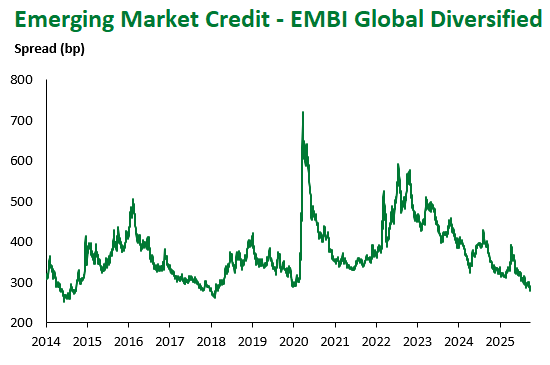
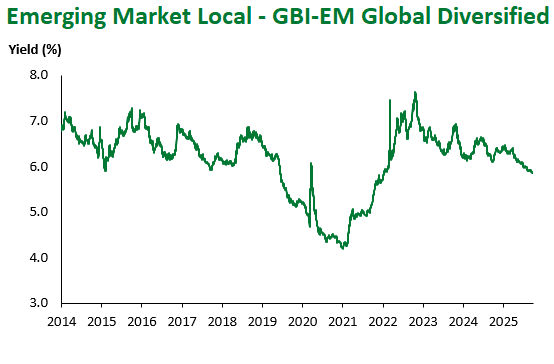
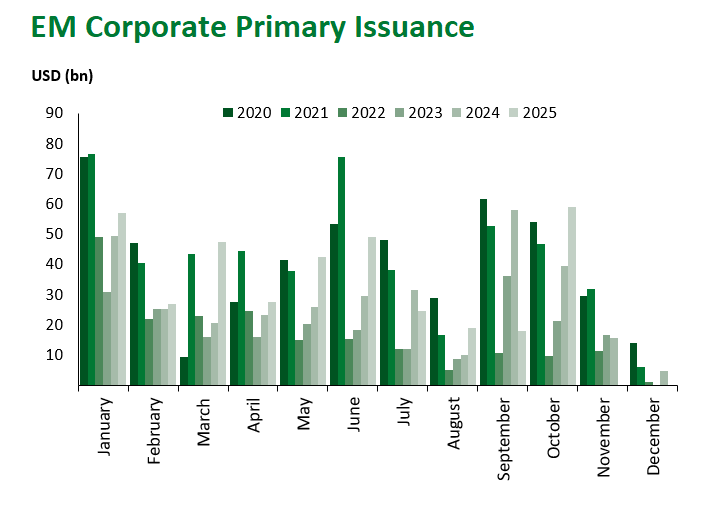
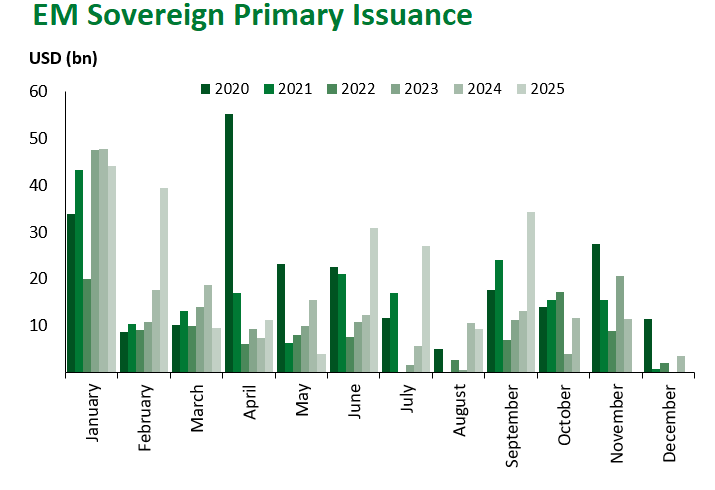
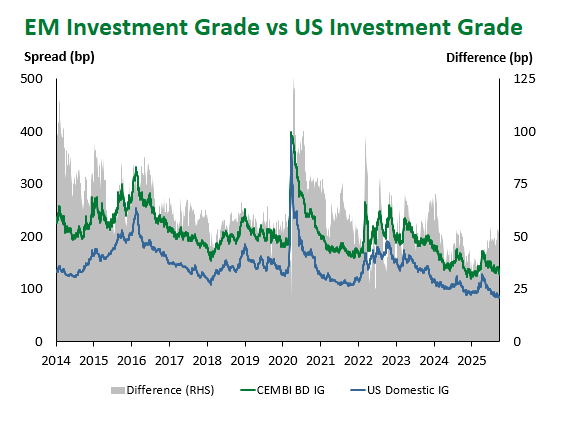
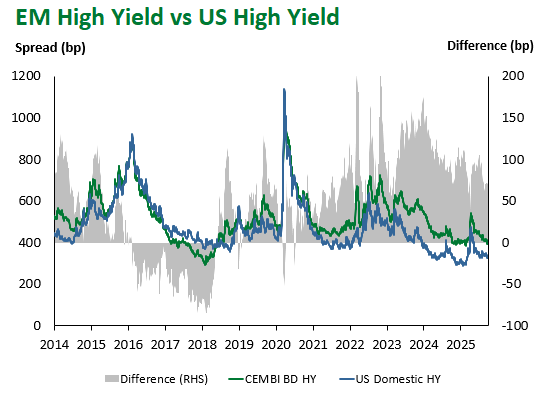
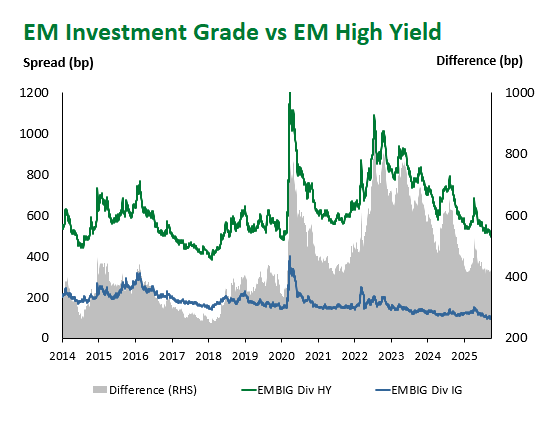
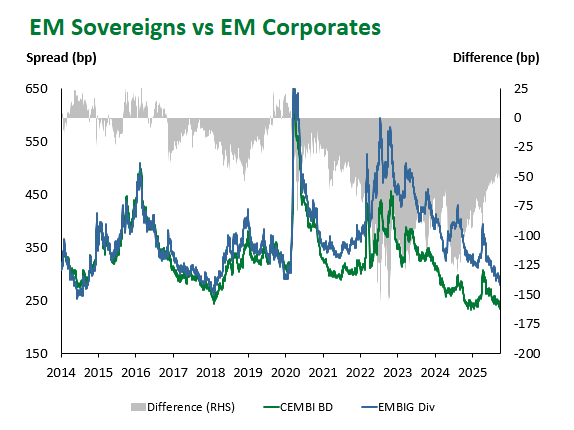
Emerging Markets Flows
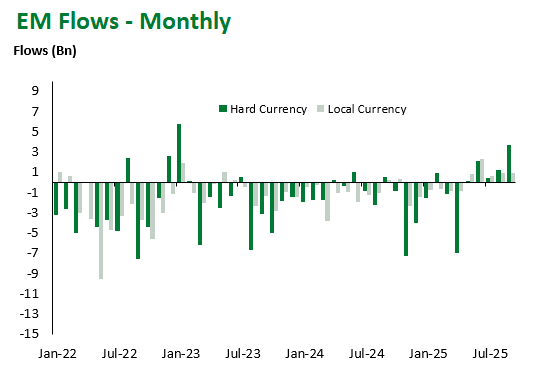
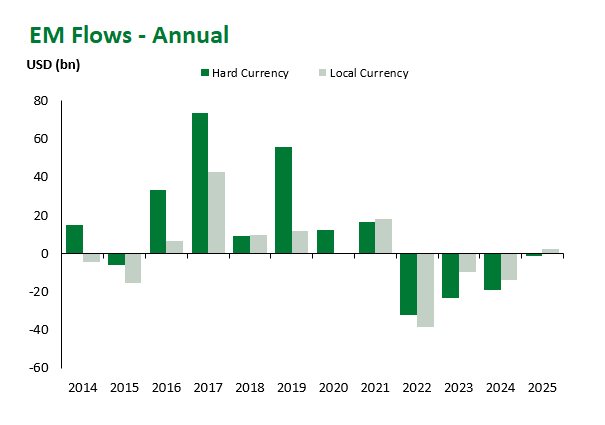
Source for graphs: Bloomberg, JPMorgan, Gramercy. As of Sept. 26, 2025.
For questions, please contact:
Kathryn Exum, CFA ESG, Director, Co-Head of Sovereign Research, [email protected]
Petar Atanasov, Director, Co-Head of Sovereign Research, [email protected]
This document is for informational purposes only. The information presented is not intended to be relied upon as a forecast, research or investment advice, and is not a recommendation, offer or solicitation to buy or sell any securities or to adopt any investment strategy. Gramercy may have current investment positions in the securities or sovereigns mentioned above. The information and opinions contained in this paper are as of the date of initial publication, derived from proprietary and nonproprietary sources deemed by Gramercy to be reliable, are not necessarily all-inclusive and are not guaranteed as to accuracy. This paper may contain “forward-looking” information that is not purely historical in nature. Such information may include, among other things, projections and forecasts. There is no guarantee that any forecasts made will come to pass. Reliance upon information in this paper is at the sole discretion of the reader. You should not rely on this presentation as the basis upon which to make an investment decision. Investment involves risk. There can be no assurance that investment objectives will be achieved. Investors must be prepared to bear the risk of a total loss of their investment. These risks are often heightened for investments in emerging/developing markets or smaller capital markets. International investing involves risks, including risks related to foreign currency, limited liquidity, less government regulation, and the possibility of substantial volatility due to adverse political, economic or other developments. References to any indices are for informational and general comparative purposes only. The performance data of various indices mentioned in this update are updated and released on a periodic basis before finalization. The performance data of various indices presented herein was current as of the date of the presentation. Please refer to data returns of the separate indices if you desire additional or updated information. Indices are unmanaged, and their performance results do not reflect the impact of fees, expenses, or taxes that may be incurred through an investment with Gramercy. Returns for indices assume dividend reinvestment. An investment cannot be made directly in an index. Accordingly, comparing results shown to those of such indices may be of limited use. The information provided herein is neither tax nor legal advice. Investors should speak to their tax professional for specific information regarding their tax situation.
